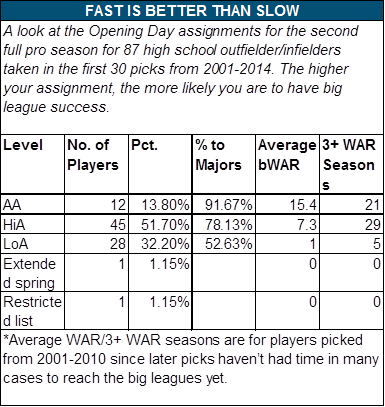"Are there any known instances where a major high school kid either undervalued or overvalued his worth publicly ahead of the draft?"
Many many instances of kids who signed for above slot or below slot or who priced themselves out of the market even after being drafted.
One example, is RHP Joe Musgrove who was a supplemental first round pick by Toronto and who signed for far less then slot. Joe was traded by Toronto to Houston following a slow first few years. He was Houston's MILB pitcher of the year and is knocking on the MLB door and is now on the forty.
An example of a kid who priced himself out of the market is RHP Cody Poteet. Drafted by the Nats in about the 20th round, he had asked for seven figures, then as the signing deadline approached, dramatically dropped the number, but it was too late. Not to worry, though, as Cody was drafted following his junior college year and is now playing.
Another example is Karsten Whitson who was a first round pick in 2010 by the Padres. The Pads thought they had a deal, but the deal fell through (over 2 mill bonus); Karsten was pitched into the ground as a freshman and after several more injury plagued college years was drafted and signed. For a nominal bonus. He was released last week.
A few years ago, RHP Brady Aiken, was very firm in his asking price. Houston drafted him as the first pick but refused to pay it (claiming very late in negotiations an arm issue [Brady subsequently needed TJ]) and drafted him anyway and didn't ink him.
Each potential draft pick is a unique story, with unique financial considerations, unique college options, etc. There is no one size fits all (though I have personal knowledge of many, many HS kids who were drafted and signed for fairly low thresholds (300k and down) who were released before they would have been draft eligible had they attended a four year college).
IMO, if a kid has a remote chance of being drafted out of HS, the family should do their thinking and planning as far in advance of the senior baseball season as possible. Once the circus of that season begins, it's easy to get swept up in the excitement and lose perspective and focus; if you lose those, bad deals can result. Best to think and plan before the pressure builds.


